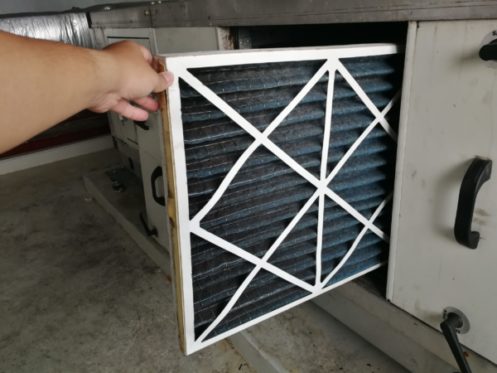HEPA Filters
HEPA filters are designed to remove 99.97% of airborne particles that are 0.3 microns or larger from the air that passes through them. HEPA is an acronym for high-efficiency particulate air.
You can use HEPA filters in various settings, including homes, offices, and hospitals. They are often used with other air purification methods, such as activated carbon filters, to provide the highest protection against indoor air pollution.
HEPA filters work by trapping particles in a mesh of extremely fine fibers. The fibers are so small that they can only be seen with a microscope. When air passes through the HEPA filter, the particles become lodged in the fibers and cannot pass through.
HEPA filters need to be replaced regularly to maintain their effectiveness. The replacement frequency will depend on the specific filter and the environment in which it is used. In general, you should replace HEPA filters every three to six months.
If you are concerned about the air quality in your home or office, a HEPA filter may be a good option. By removing airborne pollutants, HEPA filters can help improve indoor air quality and protect your health.
Types of HEPA Filters
Mechanical filters physically trap particles in a mesh or web of fibers. The fibers are so small that they can capture particles as tiny as 0.3 microns in diameter, which is smaller than a human hair’s width! On the other hand, activated carbon filters work by adsorbing particles onto their surfaces. This filter is particularly effective at removing gaseous contaminants like volatile organic compounds (VOCs) and odors.
HEPA filters are usually made from paper or fiberglass but can also be made from synthetic materials like polypropylene. Polypropylene HEPA filters are often used in industrial applications because they’re more resistant to high temperatures and chemicals.
Advantages of HEPA Filters
- They are effective: HEPA filters can remove 99.97% of airborne particles that are 0.3 microns or larger. This means they are very effective at trapping dust, pollen, pet dander, and other allergens.
- They are safe: Unlike other air purification technologies (such as ionizers), HEPA filters do not produce harmful ozone or other pollutants.
- They have low maintenance costs: HEPA filters only need to be replaced every one to two years, making them very low maintenance compared to other types of air purifiers.
Disadvantages of HEPA Filters
- They are expensive: HEPA filters are generally more expensive than other air purifiers.
- They are not 100% effective: HEPA filters are very effective at trapping particles, but they are not 100% effective. Some larger particles (such as mold spores) may be able to pass through the filter.
- They are not suitable for allergies: If you have an allergy to dust or pollen, a HEPA filter may worsen your symptoms by recirculating them back into the air. It is important to consult with an allergist before using a HEPA filter if you have allergies.
MERV Filter
MERV filter is an air filter commonly used in HVAC systems. MERV stands for “Minimum Efficiency Reporting Value” and is a rating system that indicates how well an air filter can remove particles from the air. The higher the MERV rating, the more efficiently the filter removes particles.
MERV filters are available in various ratings, from one to 16. The most common ratings for residential use are between eight and 12. Filters with a higher MERV rating will remove smaller particles from the air but may also restrict airflow more than lower-rated filters.
How MERV Filters Work
A MERV filter is a type of air filter designed to remove contaminants from the air. It works by trapping particles in the air and then redirecting them away from the lungs. This filter is often used in hospitals and other healthcare settings because it can effectively remove viruses, bacteria, and other harmful contaminants from the air. MERV filters are also used in homes and office buildings to improve indoor air quality.
MERV filters are made up of pleated paper or fabric media placed between two metal grids. The media is designed to trap particles as they pass through the filter. The size of particles trapped by a MERV filter depends on the size of the pleats in the media. The larger the pleats, the larger the particles that they can trap. The higher the rating on the one to 16 scale, the more effective the filter trapping contaminants.
MERV 16 filters are the most effective at trapping particles and are typically used in hospital operating rooms and other critical care areas. You must replace MERV filters regularly to maintain their effectiveness. The replacement frequency depends on the specific filter and the environment in which it is being used. In general, you should replace MERV filters every three to six months.
Advantages of MERV Filters
- MERV filters effectively remove a wide range of airborne particles, including dust, pollen, mold spores, and bacteria.
- MERV filters can help to improve indoor air quality and reduce the risk of respiratory illnesses.
- MERV filters can also help prolong your HVAC system’s life by trapping smaller particles that could otherwise clog the system.
Disadvantages of MERV Filters
- MERV filters can be more expensive than other types of air filters.
- MERV filters may need to be replaced more often than other air filters.
- MERV filters can strain your HVAC system, increasing energy costs.
- MERV filters can restrict airflow if not properly sized for your HVAC system.
There are a few key considerations when deciding whether a MERV filter or a HEPA filter is the better option for you. The first is the size of the particles that you need to be able to remove from the air. MERV filters are designed to remove particles between 0.3 and 10 microns in size whereas HEPA filters can remove particles as small as 0.3 microns. A HEPA filter will be more effective if you need to remove very small particles from the air.
The second consideration is the efficiency with which the filter removes particles from the air. MERV filters range in efficiency from 50-90% whereas HEPA filters have an efficiency of 95-99.97%. This means that a HEPA filter will remove more particles from the air than a MERV filter, but it will also be more expensive.
The third consideration is the cost of the filter. MERV filters are generally less expensive than HEPA filters, so if cost is a major consideration, a MERV filter may be the better option.
Finally, it is important to consider the specific needs of your home or business when deciding which type of filter to use. For example, if you have allergies or asthma, you may need to use a HEPA filter to remove as many allergens from the air as possible. If you live in an area with dust or other airborne particles, you may need to use a MERV filter to keep the air clean.
In general, HEPA filters are more expensive than MERV filters and are more effective at removing small particles from the air. However, they are not the best option for every home or business. Consider the specific needs of your space and the size of the particles you need to remove when deciding which type of filter is best for you.
On Time Experts has been offering superior HVAC services since 1981 throughout Garland, TX and the surrounding areas. Our experts are HVAC contractors trained and certified by a manufacturer to install their products. At On Time Experts, we have the knowledge and experience to install your new HVAC system properly and can help ensure that it runs smoothly and efficiently.
We offer a wide range of services, from helping you select the right HVAC system for your home or business to providing expert installation services. Our services include AC installation and repair, furnace installation and repair, plumbing, and duct cleaning. We also provide routine maintenance and repair services, ensuring that your HVAC system continues to run smoothly for years to come. We offer same-day services and complete satisfaction to our customers.
Call the experts here at On Time Experts for fast and professional HVAC and plumbing services.

